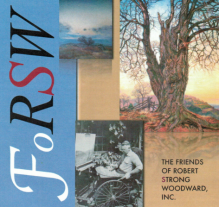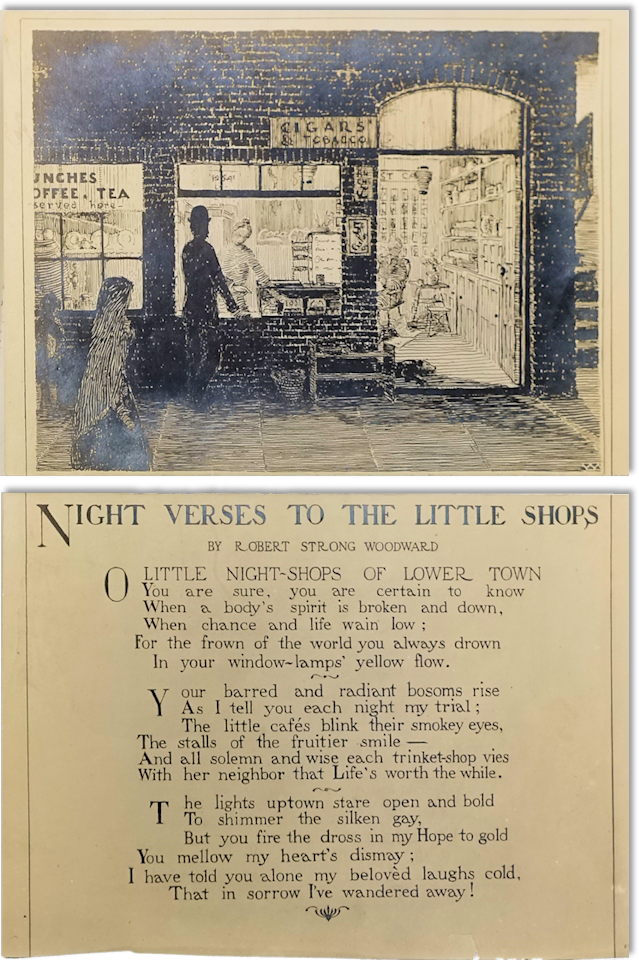Quick Reference
Unknown, believed to be from Redgate period, 1911 - 1922
Unknown- Shelburne Falls?
For print
Illustration
Illumination
Unknown
Magazine
NA
NA
Related Links
- See also the...
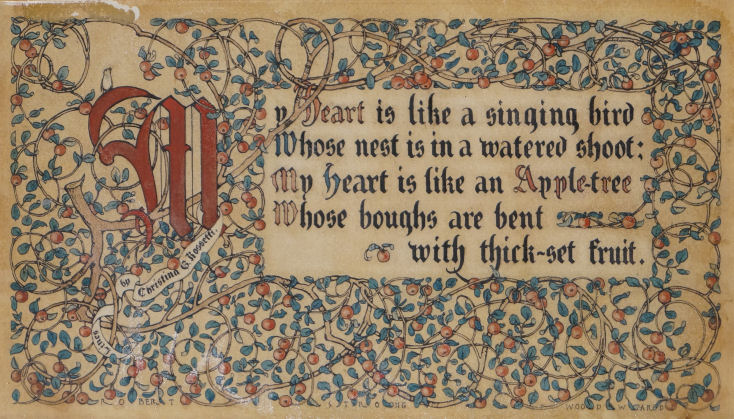 Illuminations Gallery to view related pieces.
Illuminations Gallery to view related pieces.
- See also our Scrapbook page devoted to poetry written by RSW.
- See also the...
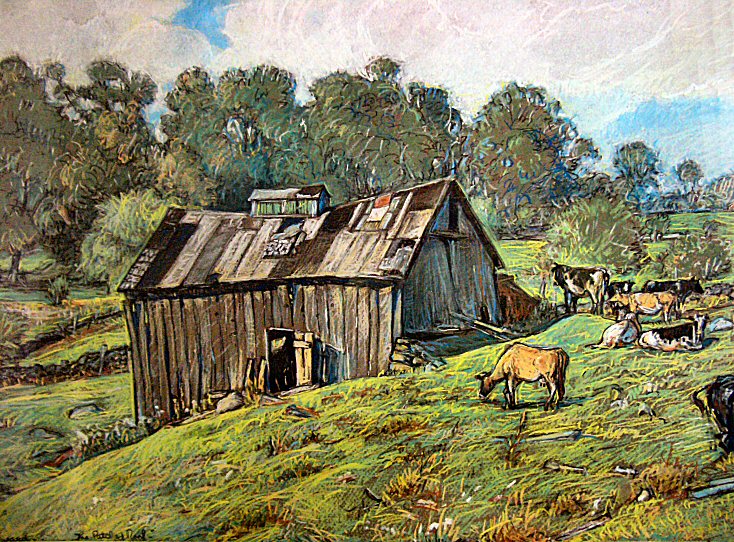 People & Livestock Gallery for related pieces.
People & Livestock Gallery for related pieces.
- See also our Scrapbook Gallery page of Archives, Letters & Documents. It includes a link to the Woodward collection at the Smithsonian Institute
- See also the...
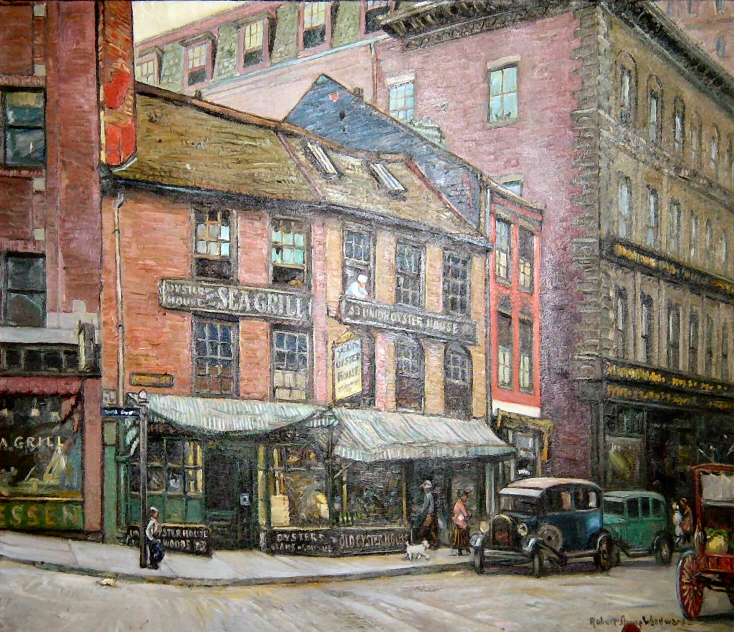 Boston Gallery to view other urban work.
Boston Gallery to view other urban work.
- See also the Roads & Streets Gallery to view related pieces.
- See our page devoted to ...
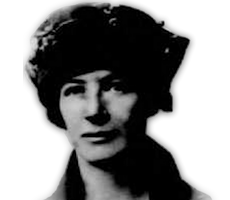 RSW friend and pen pal Helen Ives Schermerhorn
RSW friend and pen pal Helen Ives Schermerhorn
- Visit the historic Uplands
neighborhood website RSW's father Orion developed.
(Will open in a new tab)
Featured Artwork: Night Verses to the Little Shops
The Verse
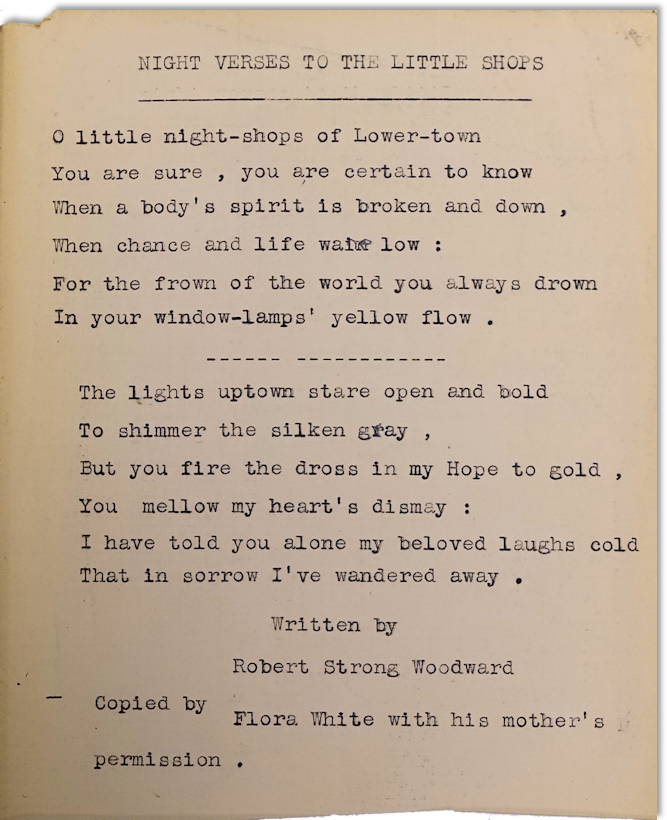
 Among the papers held by RSW's
Among the papers held by RSW's
cousin Florence was this typewritten copy
of the verse from Helen Ives' personal papers.
It contains only two of the three verses and
was copied by another cousin Flora White.
NIGHT VERSES TO THE LITTLE SHOPS
BY ROBERT STRONG WOODWARD
O' LITTLE NIGHT-SHOPS OF LOWER TOWN
You are sure, you are certain to know
When a body's spirit is broken and down,
When chance and life wain low;
For the frown of the world you always drown
In your window-lamps' yellow flow.
Your barred and radiant bosoms rise
As I tell you each night my trial;
The little cafes blink their smokey eyes,
The stalls of the fruitier smile ---
And all solemn and wise each trinket-shop vies
With her neighbor that Life's worth the while.
The lights uptown stare open and bold
To shimmer the silken gay,
But you fire the dross in my Hope to gold
You mellow my heart's dismay;
I have told you alone my beloved laughs cold,
That in sorrow I've wandered away!
Additional Notes
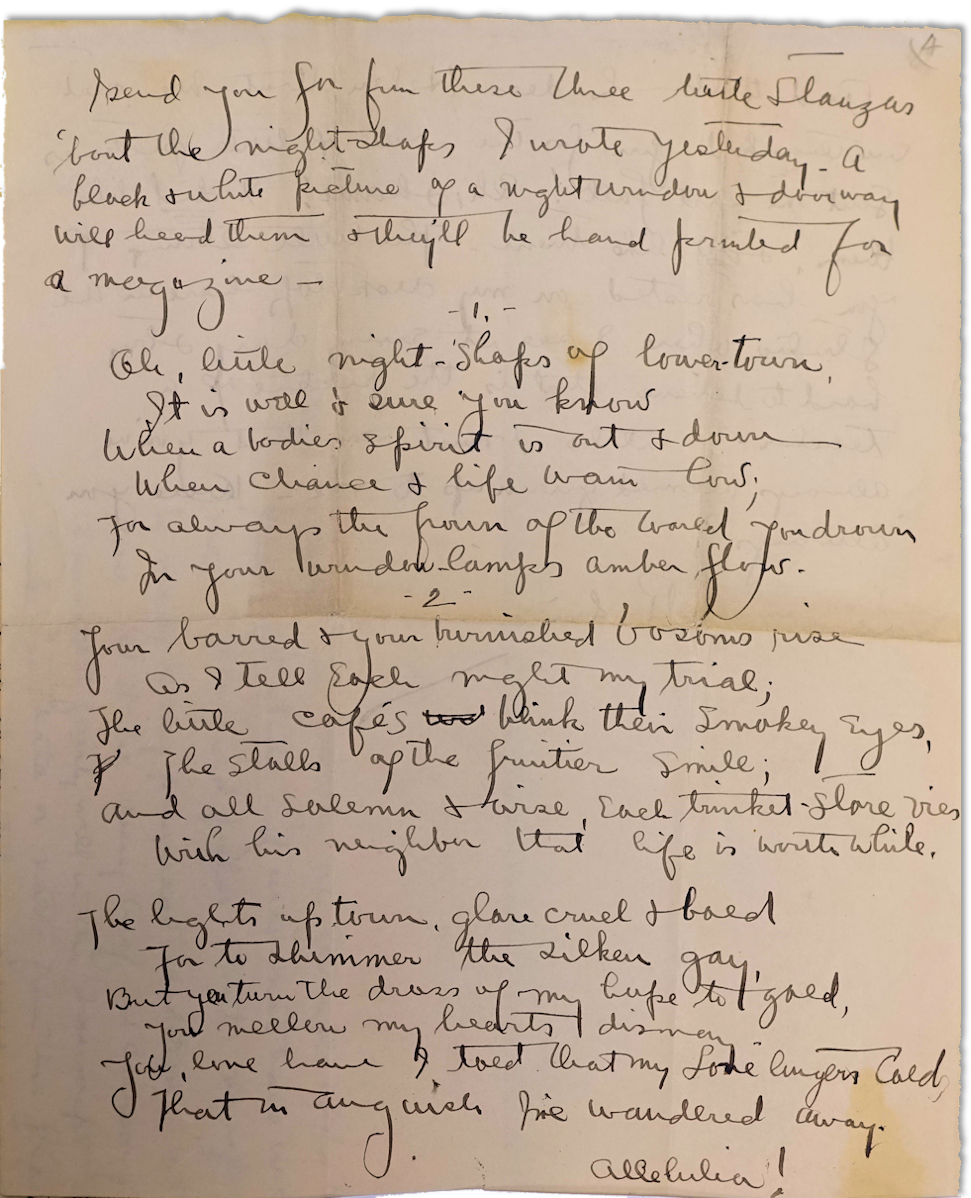
 Included in his letter to Helen is this handwritten
Included in his letter to Helen is this handwritten
page of the verse. At the top he explains it was
written for a magazines but does not name it.
 It may surprise some to learn this but RSW loved the written
word and ideas nearly as much as he did nature. He once remarked in a 1907 letter to Helen that, "I usually
wish I too might be a 'becoming writer of note' in all earnest. It would be so delightful to have something
to say to the world, something of vital life interest, and to be able to say it as one should -- to be a
Carlyle, Macaulay, a Voltaire, or Ibsen, and -- by all means a Browning. But during such wishes I catch myself
and say, knowing within me the while, that it's to be quite as beautiful to be an artist , to tell men of
godly beauty thru color and form, my religion, especially the former."
It may surprise some to learn this but RSW loved the written
word and ideas nearly as much as he did nature. He once remarked in a 1907 letter to Helen that, "I usually
wish I too might be a 'becoming writer of note' in all earnest. It would be so delightful to have something
to say to the world, something of vital life interest, and to be able to say it as one should -- to be a
Carlyle, Macaulay, a Voltaire, or Ibsen, and -- by all means a Browning. But during such wishes I catch myself
and say, knowing within me the while, that it's to be quite as beautiful to be an artist , to tell men of
godly beauty thru color and form, my religion, especially the former."
 Woodward began his career in art (1911) as a commercial artist
making illustrations for publications in print, designing bookplates (popular and fashionable at the time- a
bookplate was a sort of label for a specific "coat-of-arms" and the name from its owner to be added to a book
in the person's collection or library and among other things such as catalogues of professionals, and he made
custom "illuminations" for "any occasion" including artwork and verse.
Woodward began his career in art (1911) as a commercial artist
making illustrations for publications in print, designing bookplates (popular and fashionable at the time- a
bookplate was a sort of label for a specific "coat-of-arms" and the name from its owner to be added to a book
in the person's collection or library and among other things such as catalogues of professionals, and he made
custom "illuminations" for "any occasion" including artwork and verse.
 We continue to discover and learn more about Woodward every day.
This previously unknown work was found as part of the Helen Ives
Schermerhorn, collection of letters. There are still thousands more pages of documents to uncover. RSW's
first met Helen when he was a student at the Union Classical Institute in Schenectady, NY(1900?). They began
writing each other after he left for Peoria, IL in 1901 and became life-long friends. Upon Helen's death, her
sister-in-law- Anna, gave the letter Helen saved to to his cousin
Florence Haeberle. Florence later gave a number of letters and personal items to the
Smithsonian Institute for preservation.
We continue to discover and learn more about Woodward every day.
This previously unknown work was found as part of the Helen Ives
Schermerhorn, collection of letters. There are still thousands more pages of documents to uncover. RSW's
first met Helen when he was a student at the Union Classical Institute in Schenectady, NY(1900?). They began
writing each other after he left for Peoria, IL in 1901 and became life-long friends. Upon Helen's death, her
sister-in-law- Anna, gave the letter Helen saved to to his cousin
Florence Haeberle. Florence later gave a number of letters and personal items to the
Smithsonian Institute for preservation.

 A photo of Helen Ives Schermerhorn
A photo of Helen Ives Schermerhorn
from her 1925 passport
It is unclear what year RSW first met Helen. We are not sure of when he arrived in Schnectady. We only know he left there in December of 1901 after staying with the Schermerhorns for a period of time while his parents moved on to the next project, the historic Uplands neighborhood in Peoria. Woodward's father, Orion Leroy (O.L.), was a real estate developer and moved his family all about the country frequently. Schenectady was a detour after many years in the Midwest, mostly Ohio. If it not for Helen, we would know very little about the likes, dislikes and personal side of RSW, especially his years in Peoria, IL or his state of health and well-being in the months immediately following his tragic accident. He himself did not keep letters he received, perhaps he felt they would create too much clutter? Helen saved quite a few. We do not think she kept all of his letters (there are gaps in context) but from 1902 to as late as 1953, it seems she kept ones that had a particular interest or importance to her.

.png)
